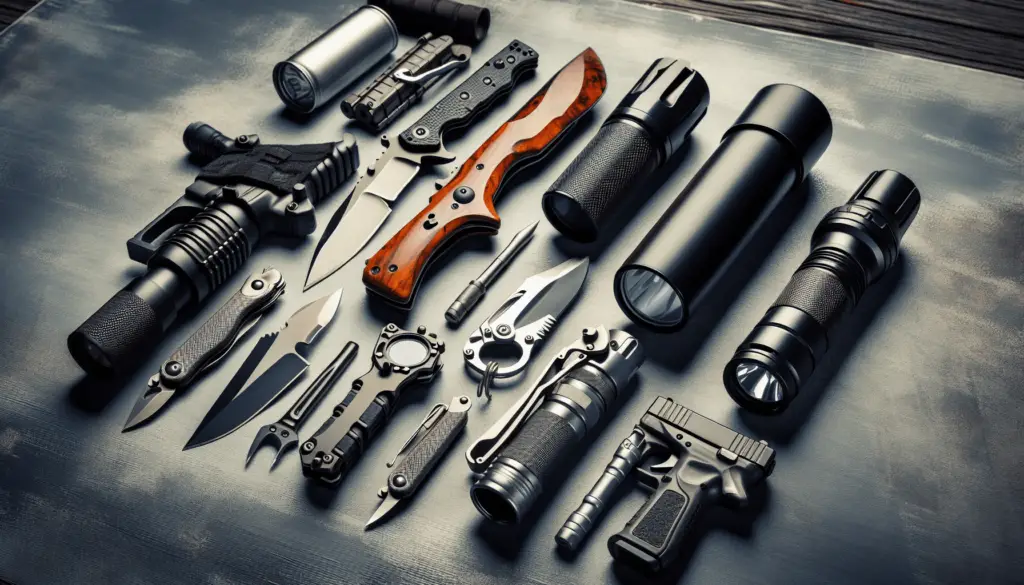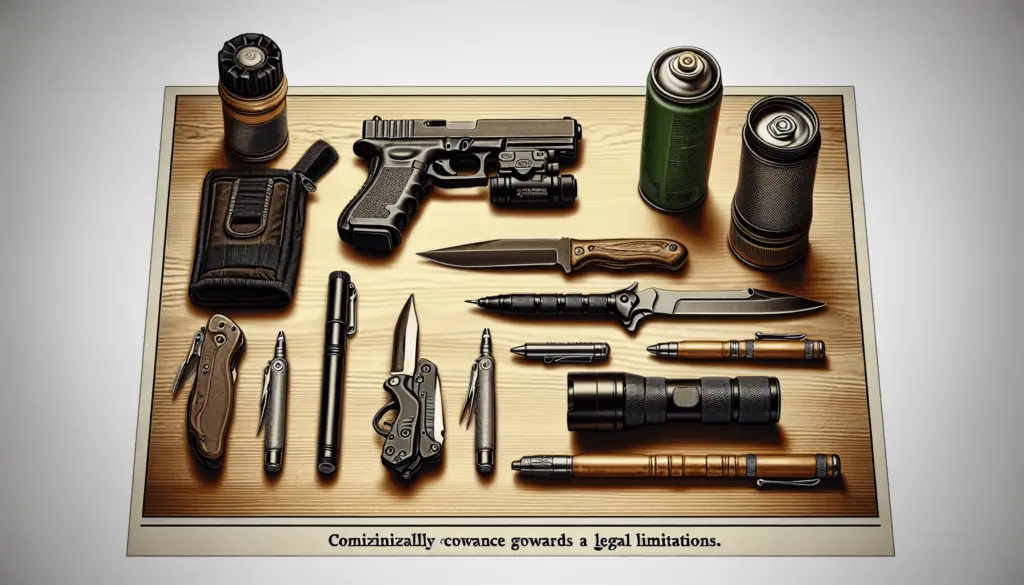Have you ever wondered how legal restrictions impact your ability to stockpile weapons and tools as a prepper? In this guide, we will walk you through the laws and regulations surrounding these items so you can navigate them effectively, ensuring you stay on the right side of the law while preparing for any situation that may arise.

Understanding Legal Frameworks for Weapons and Tools
When it comes to prepping, one of the most crucial aspects is to understand the legal frameworks governing the possession and use of weapons and tools. Laws vary from state to state and country to country, so it’s essential to familiarize yourself with the specific regulations that apply to your location. Ignorance of the law is not a valid excuse, so take the time to research and understand the legal restrictions that may impact your prepping activities.
Researching Local Laws and Regulations
Before you start stockpiling weapons and tools for your prepping activities, take the time to research the local laws and regulations that govern their ownership and use. This step is crucial to ensure that you are compliant with the legal requirements in your area. Contacting your local law enforcement agency or consulting legal professionals specializing in weapons and tools regulations can provide valuable insights into the specific laws you need to adhere to.
Types of Weapons and Tools Subject to Legal Restrictions
Various weapons and tools are subject to legal restrictions due to their potential for harm or misuse. Understanding the types of items that fall under these restrictions is essential for preppers to avoid legal trouble. Some common examples of weapons and tools subject to legal restrictions include firearms, knives, explosives, and certain types of equipment.
Firearms
Firearms are one of the most heavily regulated types of weapons across different jurisdictions. Laws governing the ownership, possession, and use of firearms vary widely, with some regions requiring strict background checks, permits, and licenses. As a prepper, it’s vital to know the regulations surrounding firearms in your area to avoid running afoul of the law.
Knives
Knives are another commonly restricted tool, with regulations often focusing on blade length, type, and intention of use. While some knives are considered everyday tools and are legal to possess, others may be classified as dangerous weapons and subject to specific restrictions. Preppers should be aware of these regulations when including knives in their prepping arsenal.
Explosives
Explosives are highly dangerous materials and are strictly regulated in most jurisdictions. Preppers should exercise extreme caution when considering stockpiling or using explosives, as violations of these regulations can result in severe legal consequences. Consulting with legal experts on the handling of explosives is essential to ensure compliance with the law.
Equipment
Certain types of equipment, such as body armor, night vision goggles, and surveillance devices, may also be subject to legal restrictions. These items are often controlled to prevent misuse or illegal activities. Preppers should research the regulations governing the possession and use of such equipment, as violating these laws can have serious repercussions.

Obtaining Permits and Licenses for Restricted Items
In some cases, obtaining permits or licenses may be required to own or use certain restricted weapons and tools legally. Preppers should familiarize themselves with the process of obtaining these permits to ensure compliance with the law. Failure to secure the necessary permits can lead to confiscation of items, fines, or even criminal charges.
Firearms Licenses
For preppers looking to stockpile firearms, obtaining the necessary licenses is essential. Depending on your location, you may need to apply for a firearm owner’s identification card, concealed carry permit, or other licenses to legally possess firearms. Make sure to follow the application procedures carefully and provide all required documentation to avoid delays or rejections.
Knife Permits
In some regions, carrying certain types of knives may require a permit or license. Preppers should investigate the specific regulations surrounding knife ownership and use in their area to determine if any permits are necessary. Applying for a knife permit can help preppers avoid legal issues related to carrying restricted blades.
Explosives Licensing
Handling explosives without the proper licensing is a serious offense that can result in severe consequences. Preppers interested in acquiring explosives for their prepping activities should obtain the required licenses and permits from the appropriate authorities. Compliance with explosives regulations is critical to ensuring the safety of yourself and others.
Equipment Authorizations
Certain types of equipment, such as body armor and surveillance devices, may require authorization for ownership or use. Preppers should check with local law enforcement agencies or regulatory bodies to determine the specific permits or licenses needed to possess such equipment legally. Adhering to these regulations is vital to avoid legal complications.
Safe Storage and Handling Practices for Weapons and Tools
As a responsible prepper, it’s essential to prioritize safe storage and handling practices for your weapons and tools. Proper storage not only protects your items from theft or damage but also prevents unauthorized access that could lead to accidents or misuse. Preppers should invest in secure storage solutions and follow best practices for handling dangerous items.
Safe Storage Solutions
Investing in quality safes, gun cabinets, or locking containers is crucial for securely storing firearms, knives, explosives, and other restricted items. Ensure that your storage solutions meet the necessary security standards and are inaccessible to unauthorized individuals, especially children and visitors. Regularly inspect your storage units to address any vulnerabilities or malfunctions promptly.
Firearm Safety Protocols
Adhering to proper firearm safety protocols is non-negotiable for preppers who own guns. Always treat every firearm as if it is loaded, keep the muzzle pointed in a safe direction, and never touch the trigger unless you intend to fire. Store ammunition and firearms separately in locked containers and educate family members on firearm safety to prevent accidents.
Handling Restricted Tools
When using restricted tools such as knives or explosives, take appropriate precautions to minimize the risk of injury or harm. Follow manufacturer recommendations for safe handling and operation, wear protective gear when necessary, and store these items securely when not in use. Regular maintenance and inspection of your tools can help prevent accidents caused by wear and tear.
Compliance with Transport Regulations for Restricted Items
Transporting weapons and tools, especially those subject to legal restrictions, requires adherence to specific regulations to avoid legal issues. Preppers should be aware of the transportation laws governing these items and take the necessary precautions to comply with them. Failing to transport restricted items legally can result in fines, confiscation, or criminal charges.
Firearm Transport Guidelines
When transporting firearms, preppers must follow the transportation guidelines outlined by their jurisdiction. Firearms should be unloaded, secured in a locked container, and kept out of reach during transit. Make sure to carry any necessary permits or licenses with you and avoid displaying firearms openly, especially in public areas where it may cause alarm.
Knife Carrying Regulations
Some regions impose restrictions on carrying knives in public or certain locations. Preppers should research the specific regulations governing knife carrying in their area to avoid legal complications. Ensure that knives are securely stored during transportation and comply with any blade length or type restrictions set by the law.
Explosives Transportation Protocols
Transporting explosives requires strict adherence to safety protocols and regulations to prevent accidents or unlawful use. Consult with local authorities or explosives experts on the proper transportation guidelines for these materials and follow them meticulously. Failure to comply with explosives transport regulations can have severe consequences, including criminal charges.
Equipment Carrying Rules
Preppers carrying restrictive equipment such as body armor or surveillance devices should be aware of any regulations governing their transport. Ensure that these items are concealed and transported discreetly to avoid drawing unwanted attention. Familiarize yourself with the specific laws regarding equipment carrying in your area to stay on the right side of the law.
Engaging in Legal Prepping Activities Responsibly
As a prepper navigating legal restrictions on weapons and tools, it’s crucial to engage in prepping activities responsibly and ethically. Respect the law, prioritize safety, and adhere to regulations to prevent legal issues that could compromise your readiness efforts. By following the rules and exercising due diligence, you can prepare effectively while staying compliant with the law.
Ethical Prepping Practices
Engage in prepping activities with a sense of responsibility and ethics, respecting the rights and safety of others in the process. Avoid engaging in illegal or unethical behavior that could tarnish the reputation of preppers as a community. By upholding ethical standards and behaving responsibly, you contribute to a positive image of prepping that benefits all practitioners.
Community Engagement
Build connections with local law enforcement agencies, community organizations, and fellow preppers to foster a sense of cooperation and mutual understanding. By engaging with the community and sharing knowledge on legal prepping practices, you can build relationships that support your preparedness efforts. Collaboration and communication are key to navigating legal restrictions effectively.
Legal Compliance Training
Consider undergoing legal compliance training or workshops to enhance your understanding of the regulations surrounding weapons and tools. Learning from legal experts or attending seminars on prepper laws can provide valuable insights and resources to help you stay compliant with the law. Invest in your education and awareness of legal restrictions to safeguard your prepping activities.
Conclusion
Navigating legal restrictions on weapons and tools as a prepper requires diligence, awareness, and a commitment to compliance. By understanding the laws governing these items, obtaining the necessary permits, following safe storage practices, and complying with transport regulations, you can prepare effectively while staying on the right side of the law. Engage responsibly in prepping activities, uphold ethical standards, and seek to build positive relationships within the community to support your readiness efforts. Remember, compliance with legal restrictions is essential to protect yourself, your loved ones, and your prepping endeavors.
